Making the Switch to Automated Restaurant Ordering: What You Need to Know


AI-enabled voice assistants have been transforming the hospitality industry in many ways. From enhancing the guest experience to creating new revenue streams, voice AI can help the hospitality industry provide better service to their guests and improve their bottom line.
According to Oracle’s Hotel 2025 study, a typical hotel guest spends 12 to 15 minutes trying to figure out how to operate the thermostat, TV, lights, and other controls in the room.
A voice-activated solution can quickly solve this frustration for guests.
According to the same study, “78% of hotel operators said voice-activated controls for lights, air conditioning, and room devices would be mainstream or in mass adoption by 2025.”
Here are five uses cases where we believe voice AI can have a significant impact in the hospitality industry:
Hotels can leverage voice AI technology to provide a personalized guest experience. They can use the technology to create a virtual concierge that guests can interact with using just their voice.
Throughout the years, guests and customers have come to expect excellent customer service while in an establishment, and between mobile devices, tablets, and digital signage, modern consumers also have a growing desire to be self-sufficient.
According to another study, Using AI to Enhance the Guest Experience, “89% of hoteliers “agree” or “strongly agree” that targeted personalization – i.e., presenting guests with highly relevant messages, offers, and services at the right time – is one of the most effective ways to improve the guest experience.”
Although a traditional concierge is often charming, a virtual concierge kiosk is always quick, efficient, and knowledgeable.

The virtual concierge can provide guests with information about the hotel, its amenities, nearby attractions, and more. It can also enable guests to make restaurant reservations, order room service, or even book a spa appointment. By providing personalized recommendations and assistance, the hotel can create a memorable guest experience that sets it apart from its competitors.
“89% of hoteliers “agree” or “strongly agree” that targeted personalization – i.e., presenting guests with highly relevant messages, offers and services at the right time – is one of the most effective ways to improve the guest experience.” – Using AI to Enhance the Guest Experience, Oracle
Voice AI can help streamline hotel operations by automating tasks that would otherwise require staff time and resources. For example, guests can use their voice to check in and check out of the hotel. This would eliminate the need for front desk staff to manually check guests in and out, freeing up staff time to focus on other tasks.
Voice AI can also be used to control room features, such as lights and temperature, which can improve operational efficiency by reducing energy consumption.
Hotels can leverage voice AI to augment and support labor issues. For example, technology can also be used to schedule cleaning and maintenance tasks, which can help ensure that all rooms are properly cleaned and maintained. Additionally, voice AI can be used to augment the front desk and concierge so you could provide service 24/7 with consistently accurate information. This could dramatically lower costs for a hotel that would traditionally have to outsource to a live call center which can be costly and not on brand or message.
Offer guests personalized concierge and guest services through simple voice conversations, while increasing staff productivity with real-time assistance.
%
of hoteliers named voice-enabled technology as having the greatest potential in the near-future
Source: 2019 Lodging Technology Study
%
of guests are more likely to return to a property with helpful technology
Source: Hospitality Technology
%
of hoteliers believe that AI will yield the most benefits in serving tomorrow’s guests
Source: Hospitality Technology
Voice AI can create new revenue streams for hotels and the hospitality industry. For example, hotels can use technology to up-sell and cross-sell services. Guests can quickly order food and drinks from hotels or local city restaurants. The hotels can use voice AI to sell advertising space to local businesses, which can help generate additional revenue for the hotel. It can also provide guests with personalized recommendations on products and services that are relevant to their interests.
Reinvent the guest experience: Give your guests the personalized, authentic, and attentive experience they want. Voice assistants offer personalized restaurant or spa suggestions and provide guest services from before check-in to after check-out.
Voice AI also provides contactless solutions that are particularly valuable in the post-pandemic era. Guests can use their voice to control various features of their room, such as lighting, temperature, and entertainment systems, without having to touch any surfaces. Voice AI can also be used to make payments, such as ordering room service or making restaurant reservations, reducing the need for guests to handle physical cash or credit cards. This not only provides a safer and more hygienic experience for guests but can also help hotels reduce the risk of viral transmission and comply with health and safety regulations.
If you are interested in learning more about what types of use cases may be best suited for your business, reach out to SoundHound today.
Our field experts can help you to devise a plan to begin implementing a hospitality solution.
At SoundHound, we have all the tools and expertise needed to create custom voice assistants and a consistent brand voice.